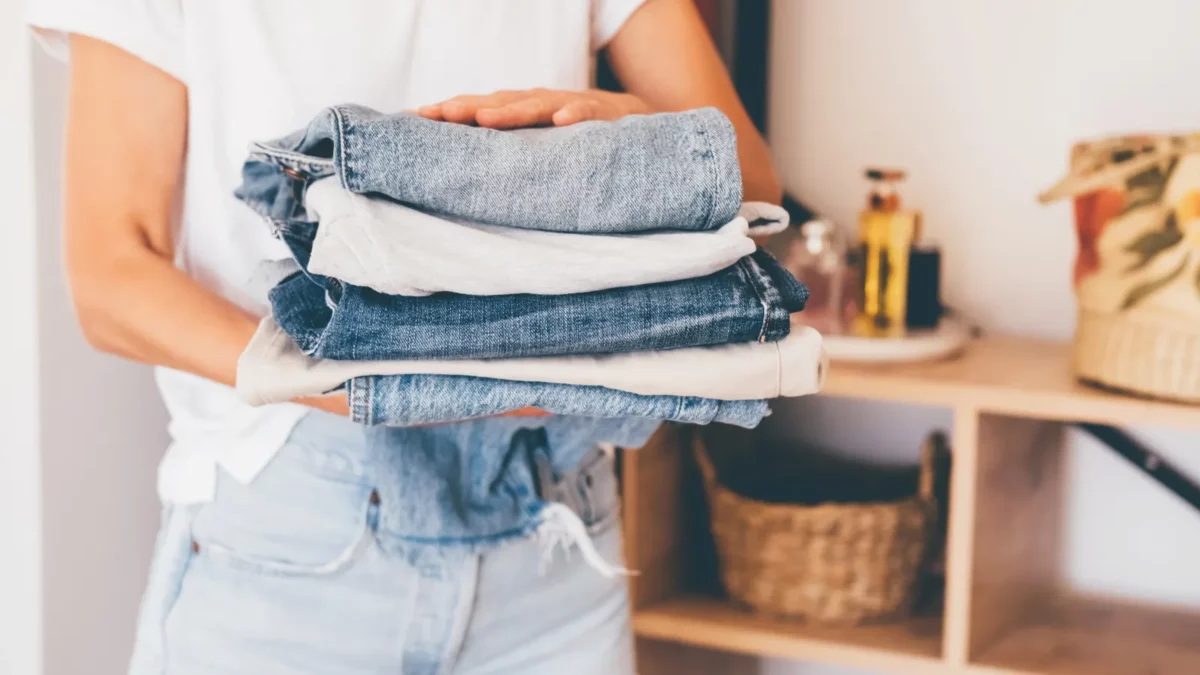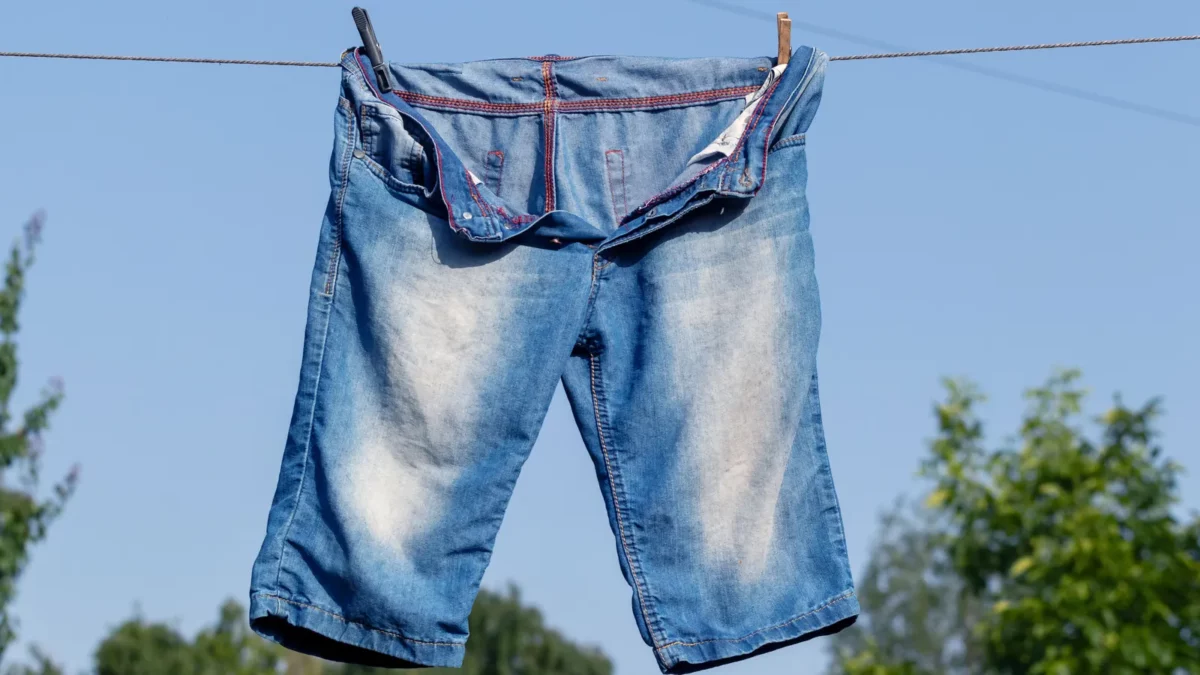Whether you are a jeans enthusiast or are in the process of making a capsule wardrobe, the question of how often you should wash jeans pops up in your head. We share some practical advice to keep your jeans fresh and long-lasting. You can thank us later.
How Often Should You Wash Jeans?
We will first debunk one of the greatest myths: washing jeans will ruin them. This statement is not precisely true.
You shouldn’t wash your jeans after every wear, especially if there aren’t any visible stains. However, never throwing them in the wash is also pretty extreme. The good rule of thumb is washing jeans after 3-10 wears. So, how do you find the balance? Consider these things:
- Level of activity. The more you wear your favorite pair of jeans, the more often you must wash them. If you engage in activities that include dirt, mud, or something else that will leave stains, then you should definitely wash them more than usual.
- Spills and stains. – Spot-cleaning is possible without washing the whole pair of jeans, depending on the type of spills and stains.
- Odor. When jeans develop an unpleasant scent, it is one of the clearest indicators they need washing. Remember that this can also happen when you wear your jeans in humid environments.
- Personal preference. Some people prefer crisp jeans, always perfectly washed. Others may prefer wash-out jeans that develop fading shade after washing. It is up to you.
- Material Jeans are made of. Classic denim is made of 100% cotton and made to be very durable without the need for frequent washing. However, if the jeans have a few or more percentages of spandex or polyester woven in them, then you should wash them more often. The stretchy jeans need more washing to reactivate their stretchy fibers than regular cotton jeans.
What’s the Best Way To Clean Jeans?

These tips will help clean the jeans without ruining them, even if you wash them more often than usual.
Wash in Cold Water
When you are ready to wash your jeans, do it on a cold cycle. A hotter wash can potentially damage the fabric. Also, heat is not good for your jeans. It can shrink them. If your jeans come out tight and shrunken, then you have used a hot cycle that is not suitable.
Always wash your jeans at 30 degrees. You will not only save the jeans from damage but also your electricity bill will be lower.
Turn Them Inside Out
Jeans should be washed inside out to protect their dye. When you wear your jeans, they naturally lose their color in certain places. That is why every pair is unique.
Instead of worrying about the dye, especially when you buy a new pair of jeans, throw them in the laundry turned inside out.
Air Dry Jeans
Jeans experts recommend air drying your jeans instead of using a dryer. They say that jeans can be ruined when dried due to heat exposure. Instead, air dry them and make sure to turn them inside out. Keep them in the shade, though. Direct sunlight will gradually damage the shade of your jeans.
Use Detergent Lightly
It is easy to forget that adding more detergent to your washing machine won’t make the laundry cleaner. However, the opposite is true.
Instead of loading up on detergent, use a small amount of mild detergent. Otherwise, the machine won’t be able to wash off the detergent, and you will end up with residue on your clothes.
Hanging Jeans in the Shower
Sometimes, your jeans don’t need a complete wash but just a quick refresh. What to do? Hang them in the shower. The steam will get out the creases, kill bacteria, and stop odor. This is a quick and easy way to clean the jeans without getting them in the machine.
Try the Freezer Method
The freezer method is controversial, but most people say it is effective. There have been rumors that putting your jeans into the freezer can clean them, and there is actually some truth in that.
Cold temperatures will freeze the molecules that we recognize as body odor. Also, if your jeans have any visible dirt on them, you will be able to scrape it off after freezing them.
However, this is not a complete alternative to washing. You can definitely give this method a go, but don’t expect too much.
Use a Toothbrush for Small Stains
When you accidentally drop something on your favorite pair of jeans, don’t panic instantly. This doesn’t mean they are ruined and certainly doesn’t mean they need a full wash. Instead, find an old toothbrush and soap.
Use a wet cloth or a toothbrush with mild soap to remove stains on your jeans. Be careful, though. Adding soap to certain areas and rubbing it too harshly can affect the color of the jeans. If the stain is greasy, you can use a liquid detergent and a wet sponge.
Try to take care of that stain as quickly as possible. Otherwise, it can seep into the denim fibers, so you will need to wash them completely.
Salt and Vinegar to the Rescue
New jeans have a tendency to bleed, especially after that first wash. You can prevent that from happening by calling salt and vinegar to the rescue. This combination will lock the dye before you put the garments in the machine. In fact, white vinegar is great as a softener substitution and for removing the bed odor.
Fill the bucket with approximately 4.75 quarts of water, 75 grams of salt, and 8 fluid ounces of white vinegar. Soak the jeans in the mixture, leaving them for 24 hours. Rinse them with cold water.
How Much Is Too Much?
Is there such a thing as washing your pair of jeans too much? Definitely. But how much is too much?
Washing your jeans often can affect the color. Jeans will fade quicker, and you can become unsatisfied with the wash, even though your jeans are barely new.
You can also think about the environment. Doing laundry every day is not eco-friendly, right? It can take up loads of energy – an average machine needs 350-500 watts of electricity per use.
What Happens When You Don’t Wash Your Jeans?
Some people, including superstars, claim they never wash their jeans. They simply wear them until they get bored and buy a new pair. The only way of cleaning them is by hanging them to air dry and freezing them.
The main issue in both of these cases is that excess dirt, sloughed-off skin, and bacteria stick to jeans. Researchers claim that freezing doesn’t kill the bacteria and doesn’t remove dirt. Dirt is a combination of food, dead skin cells, oils, and bacteria that mix together and wove in the denim fibers. When you don’t clean them properly, dirt will eventually damage the pants.
The longer you go without washing your pair of jeans, the more likely it is for the dirt to break down the dye and contribute to fading.
The Best Way to Dry Your Denim

Fashion experts say the best way to dry your denim is to air-dry. It is a good idea to keep your jeans out of a dryer to prevent shrinkage and fading. Here is what you need to do to properly dry your jeans.
Removing Excess Moisture First
After washing your jeans, gently squeeze them to remove any excess moisture. Avoid twisting them or stretching the fabric. Give the jeans a good shake so they get to their previous shape. Smooth out wrinkles and straighten the cuffs and seams.
Air-Dry Them
Find a good area where you can dry your jeans. It should be properly ventilated, where you can hang jeans up. Use a drying rack and make sure to hang them in a way to preserve their shape. You can fold them or use pant hangers.
Avoid Direct Sunlight
When you decide to dry your jeans outside, make sure to avoid putting them in direct sunlight. This may speed up the process of drying, but it can also fade the color of your denim.
Can You Tumble Dry Jeans?
If you are in a hurry and want to throw your jeans in the dryer, keep the temperature low or use an option with no heat. You can also toss wool dryer balls into the machine. The balls will shorten the time of drying, prevent static cling, and soften your jeans.
FAQ
Is It True That Denim Jeans Should Not Be Washed? If So, Why?
No, it is not true that denim jeans shouldn’t be washed at all. In fact, this can also ruin your favorite pair of jeans. Excess dirt, including bacteria and skin cells, will go into the denim fabric and damage it.
How Often Should You Wash Ripped Jeans?
Depending on how much your jeans are ripped, the less you wash them, the better. If your jeans are really ripped, then think about hand-washing them. Use a mild soap and an old toothbrush for stains, and follow the instructions on the label.
